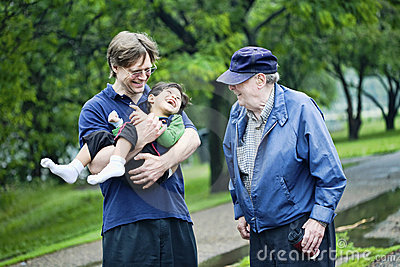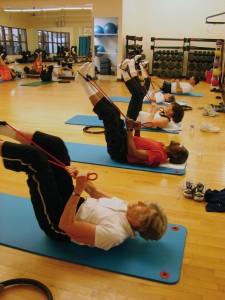by Michelle Sutton-Kerchner
Managing a career and dependent relatives, young and old, leaves little nurturing for the caregiver-of-all. Learn ways to care for yourself so you can continue to take care of others …
At the onset, a caretaker is often driven. A situation or event is motivation to take proactive measures in caring for a loved one. Determination to provide comfort and support stokes the nurturer within us. However, this lifestyle is more a triathlon than a sprint, a duration spiked with various intensity levels and challenges. In order to succeed, you need to pace yourself and remain healthy to endure.
Only You
Often, those in a caretaker’s charge become so attached that they resist assistance from others. Whether supervising a toddler or elderly person, it can take effort and mental fortitude to separate for essentials, such as a job or groceries. To take a break for personal relaxation or self-care seems an impossible luxury. However, just as important as a trip to the bank, you need to deposit some time for your own well-being. Neglecting your own needs may seem noble. But, martyrs went out of vogue in the Middle Ages. You’ll be left with resentment, at best, and your own illness at worst.

Assure loved ones the time apart is essential for stress-relief, and that you will return with energy and a renewed spirit. Simply dealing with today’s healthcare ambiguities requires a well-rested mastermind. Take what’s needed for your own health without feeling guilty.
Accept invitations for help. As a society, we often attempt super hero status and try to go it alone. Offers to assist are usually sincere. Take them with gratitude and give another an opportunity to “do their part.” A friend in need is a friend indeed.
This person, with fresh ideas and a bright smile, can be a companion to your loved one. Sharing the responsibility allows you a break and introduces another caretaker, even if just for a half-hour while you’re in the next room. Gradually, you may gain additional freedom while confident another trustworthy soul is sharing this journey with you.
Consider joining a support group. Although you may not be able to commit to weekly meetings or much involvement, membership alone can put you in touch with others. A network of those caring for the sick or debilitated can share experiences, solutions, and companionship. Many of these groups are online, opening a world of discussions and chats 24/7 for that 3:00 a.m. “voice” when you might need it most.
Check out sites like www.caregiver.com or www.aaaphx.org for material helpful to caregivers. Organizations of major illnesses usually have support groups for the patient as well as his/her family. Contact your local Human Services department (county government office), which can direct you to local sources.
The Center is an ideal setting for meeting others who are overcoming personal or familial health issues. Connect with them and learn their story over a quick workout or soothing soak in the hot tub. A workout buddy often helps members remain accountable to a healthy diet, regular workout, and other fitness goals. Your unique bond can help you be accountable to simply show up at the Center and do something healthy for yourself.
Take advantage of Community Outreach programs offered at the Center. A topic might be relevant to your situation or something about which you’re curious. Either way, you’re interacting with a community. Reputable, interesting programs are a trustworthy source, and reinforce you and your loved ones are not alone. Support is usually most effective when it’s social in nature.
Much has changed with our societal structure since the concept of “It takes a village ….” However, our basic human needs remain. Perhaps rephrase this philosophy to “It takes the Center ….”
Exercise for a Worthy Cause: You
Metabolize your body’s stress hormones, reduce pent-up frustration, and focus on your own body and all it does. Caregivers can multitask their self-time by improving physical and mental health simultaneously through a workout. Take it easy on yourself and acknowledge all you’ve given. Then, give some more—this time leaving it all on the Exercise Floor. By helping to expel stress, the likelihood of chronic stress syndrome, with its long-term deterioration of your health, is minimized.
Perhaps use your personal fitness endeavors as another opportunity to help your struggling loved one. Many organizations (e.g., Susan G. Komen for the Cure® breast cancer foundation or Walk to End Alzheimer’s™ [or www.alz.org]) host racing/walking events to raise funds for medical research and dissemination of factual information. Events with such a mission can provide a new dimension for your fitness routine. Be inspired by training to help a cause dear to your heart. Then, exercise is not just about your own health but also about that of the community at large, including loved ones under your care and awaiting your return from a regular Center visit.

A personal trainer can customize an efficient exercise program for you. Accomplish what is essential to your body in minimal time, which likely includes building stamina and approaching life with fresh energy. A short workout done well can be just as effective as a lengthy one. Perhaps a trainer also can share tips on how your distressed relative can remain mobile during this time.
Get those workout endorphins going!
Eat Quality Foods
In times of crisis, lack of time or energy lends to poor nutrition. Although a serving of junk food might feel good going down, the effect is short-term. Comfort foods may make happy taste buds, but can actually exacerbate stress. A major cause of weight gain is due to emotional eating. Many choose salty or sweet foods when tensions are high. Lack of time and planning can lead to frequently dining out, or picking up fast food. Portions can be large and mega-processed. For more on emotional eating, see “Hungry for Comfort” at www.fitnessandwellnessnews.com/nutrition/hungry-for-comfort.
Good eating benefits both you and those for whom you are caring. Preparation doesn’t have to be involved or expensive. Include the basics: proteins, fruits, and veggies for a meal that encourages health and stamina. Junk food, with its high fat and sugar content, makes you sluggish and bloated. That’s never a treat.
Forms of Pampering
Pampering yourself is a way of acknowledging your worth and rewarding your efforts. There are small, easy ways to give yourself a break. Try these:

- Consider a new hobby. This might not be a good time to become a marathon runner, but attending a new Group Fitness class or cooking seminar improves your health in multiple ways without much effort. Starting something new requires you to focus and live “in the moment.” It eases the mind of worries with a positive distraction. It can have therapeutic effects, and allow solutions to surface that were previously unclear.
- Rest, even if only for a 15-minute snooze. Caretakers often don’t have the benefit of a good night’s sleep. Fit in power naps whenever possible. If you don’t officially fall asleep, you can at least try to regulate your breathing to bring your body to a relaxed meditative state. Sleep deprivation can increase feelings of depression and being overwhelmed. Do your best to get some rest.
- Develop or evoke religious or spiritual beliefs. Those whose lifestyle includes some aspect of religion are scientifically shown to be healthier. Many, particularly senior adults, rely on prayer to carry them through times of stress and emotional despair. Whether you choose prayer, group religion, meditation, or your own version of spirituality, be sure it nurtures your soul. Perhaps you can share this ritual with your loved one, helping to care for all aspects of his/her life.
- Indulge in brain teasers for a mini mental vacation. Crossword puzzles, word finds, and stress-management cryptograms are a fun outlet for a tired brain.
Research with Caution
The Internet is a powerful tool. Used wisely, it can provide solutions, facts, and topics to discuss with your physician. Caregivers, under stress and the desire for solutions, often surf the ‘net with one foot off the surf board. Before you allow your mind to jump to World Wild Web conclusions, ask your treating physician for reliable Web sites applicable to your situation. Even the most grounded among us has faltered and fallen in fear from a catchy article title and its supposed “facts.”
Supervise your dependants with respect to this. The elderly and underage are often targets for gimmick supplements and products.
Hire Away
Two-thirds of caregivers work outside the home. Juggling these multiple roles during the day is exhausting. Consider hiring someone to help. There are official respite care services, such as adult daycare and short-term off-site care. If you cannot give up your care responsibilities, consider hiring services to handle lawn care, house cleaning, and laundry. You’ll have more time to spend with your loved one and a better chance of benefiting from much-needed alone time (for that workout!).
No Shame in Reaching Out
Caretaking is a tough, sometimes lonely endeavor. If you’re feeling suicidal or seriously overwhelmed, call a crisis hotline. Try 1-800-784-2433 or 1-800-273-8255 in the United States. Or, talk with Center staff, who can lead you in the right direction.
You’re Worth It
You know yourself best. Use whatever means to take care of yourself. You deserve it, and so do your loved ones. Failure to do so may require a caretaker for you.
Sources
“Caregiver Stress: Tips for Taking Care of Yourself,” at www.mayoclinic.com.
“Caregiver Support: Caregivers and Stress Relief,” by Elizabeth Scott at www.about.com.
“I’m Overwhelmed, and I May Be Experiencing Caregiver Burnout. Help!” by Elizabeth Scott at www.about.com.
“Top 10 Self-Care Strategies for Overall Stress Reduction,” by Elizabeth Scott at www.about.com.
Image Credits
Hands with flower (introductory photo): © Kapp at www.dreamstime.com
Three generations: ©Jarenwicklund at www.dreamstime.com
 Fitness & Wellness News Your Source for Fitness News, Wellness News, Health News, and Nutrition News!
Fitness & Wellness News Your Source for Fitness News, Wellness News, Health News, and Nutrition News!



